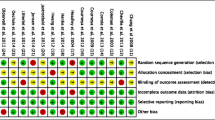Abstract
Purpose
Few randomized controlled trials in exercise oncology have examined survival outcomes. Here, we report an exploratory follow-up of progression-free survival (PFS) from the Healthy Exercise for Lymphoma Patients (HELP) Trial.
Methods
The HELP Trial randomized 122 lymphoma patients between 2005 and 2008 to either control (n = 62) or 12 weeks of supervised aerobic exercise (n = 60). PFS events were abstracted from medical records in 2013. In addition to the randomized comparison, we explored the effects of exercise adherence (<80 % vs. ≥80 %) and control group crossover (no vs. yes).
Results
After a median follow-up of 61 months (interquartile range 36–67), the adjusted 5-year PFS was 64.8 % for the exercise group compared with 65.0 % for the control group (Hazard ratio [HR] 1.01, 95 % CI 0.51–2.01, p = 0.98). In the secondary analysis, the adjusted 5-year PFS was 59.0 % in the control group without crossover compared with 69.2 % for the control group with crossover (HR 0.68, 95 % CI 0.22–2.06, p = 0.49), 67.7 % for the exercise group with <80 % adherence (HR 0.72, 95 % CI 0.28–1.85, p = 0.50), and 68.4 % for the exercise group with ≥80 % adherence (HR 0.70, 95 % CI 0.32–1.56, p = 0.39). In a post hoc analysis combining the three groups that received supervised exercise, the adjusted 5-year PFS for the supervised exercise groups was 68.5 % compared with 59.0 % for the group that received no supervised exercise (HR 0.70, 95 % CI 0.35–1.39, p = 0.31).
Conclusions
This exploratory follow-up of the HELP Trial suggests that supervised aerobic exercise may be associated with improved PFS in lymphoma patients. Larger trials designed to answer this question are needed.

Similar content being viewed by others
References
Canadian Cancer Society’s Steering Committee on Cancer Statistics (2014) Canadian cancer statistics 2014. Canadian Cancer Society, Toronto
Courneya KS, Sellar CM, Stevinson C, McNeely ML, Peddle CJ, Friedenreich CM, Tankel K, Basi S, Chua N, Mazurek A, Reiman T (2009) Randomized controlled trial of the effects of aerobic exercise on physical functioning and quality of life in lymphoma patients. J Clin Oncol 27:4605–4612. doi:10.1200/JCO.2008.20.0634
Jochem C, Leitzmann MF, Keimling M, Schmid D, Behrens G (2014) Physical activity in relation to risk of hematologic cancers: a systematic review and meta-analysis. Cancer Epidemiol Biomark Prev 23(5):833–846. doi:10.1158/1055-9965.EPI-13-0699
Vermaete NV, Wolter P, Verhoef GE, Kollen BJ, Kwakkel G, Schepers L, Gosselink R (2013) Physical activity and risk of lymphoma: a meta-analysis. Cancer Epidemiol Biomark Prev 22(7):1173–1184. doi:10.1158/1055-9965.EPI-13-0182
Courneya KS, Jones LW, Fairey AS, Campbell KL, Ladha AB, Friedenreich CM, Mackey JR (2004) Physical activity in cancer survivors: implications for recurrence and mortality. Cancer Ther 2:1–12
Godin G, Shephard RJ (1985) A simple method to assess exercise behavior in the community. Can J Appl Sport Sci 10(3):141–146
Cheson BD (2007) The International Harmonization Project for response criteria in lymphoma clinical trials. Hematol Oncol Clin North Am 21(5):841–854. doi:10.1016/j.hoc.2007.06.011
Courneya KS, Segal RJ, McKenzie DC, Dong H, Gelmon K, Friedenreich CM, Yasui Y, Reid RD, Crawford JJ, Mackey JR (2014) Effects of exercise during adjuvant chemotherapy on breast cancer outcomes. Med Sci Sports Exerc 46(9):1744–1751. doi:10.1249/MSS.0000000000000297
Courneya KS, Segal RJ, Mackey JR, Gelmon K, Reid RD, Friedenreich CM, Ladha AB, Proulx C, Vallance JK, Lane K, Yasui Y, McKenzie DC (2007) Effects of aerobic and resistance exercise in breast cancer patients receiving adjuvant chemotherapy: a multicenter randomized controlled trial. J Clin Oncol 25(28):4396–4404. doi:10.1200/JCO.2006.08.2024
Myers J, Prakash M, Froelicher V, Do D, Partington S, Atwood JE (2002) Exercise capacity and mortality among men referred for exercise testing. N Engl J Med 346(11):793–801. doi:10.1056/NEJMoa011858
Sui X, LaMonte MJ, Laditka JN, Hardin JW, Chase N, Hooker SP, Blair SN (2007) Cardiorespiratory fitness and adiposity as mortality predictors in older adults. JAMA 298(21):2507–2516. doi:10.1001/jama.298.21.2507
Visser M, Goodpaster BH, Kritchevsky SB, Newman AB, Nevitt M, Rubin SM, Simonsick EM, Harris TB (2005) Muscle mass, muscle strength, and muscle fat infiltration as predictors of incident mobility limitations in well-functioning older persons. J Gerontol A Biol Sci Med Sci 60(3):324–333
Quinten C, Coens C, Mauer M, Comte S, Sprangers MAG, Cleeland C, Osoba D, Bjordal K, Bottomley A (2009) Baseline quality of life as a prognostic indicator of survival: a meta-analysis of individual patient data from EORTC clinical trials. Lancet Oncol 10(9):865–871. doi:10.1016/S1470-2045(09)70200-1
Svensson H, Hatschek T, Johansson H, Einbeigi Z, Brandberg Y (2012) Health-related quality of life as prognostic factor for response, progression-free survival, and survival in women with metastatic breast cancer. Med Oncol 29(2):432–438. doi:10.1007/s12032-011-9844-9
Courneya KS, Sellar CM, Trinh L, Forbes CC, Stevinson C, McNeely ML, Peddle-McIntyre CJ, Friedenreich CM, Reiman T (2012) A randomized trial of aerobic exercise and sleep quality in lymphoma patients receiving chemotherapy or no treatments. Cancer Epidemiol Biomark Prev 21(6):887–894. doi:10.1158/1055-9965.EPI-12-0075
Acknowledgments
The research for this article was funded by a grant from the Lance Armstrong Foundation. KSC is supported by the Canada Research Chairs Program. CMF is supported by Health Senior Scholar Awards from Alberta Innovates-Health Solutions and the Alberta Cancer Foundation’s Weekend to End Women’s Cancers Breast Cancer Chair. TR is Canadian Cancer Society Research Chair at the University of New Brunswick.
Conflict of interest
The authors report no conflicts of interest.
Author information
Authors and Affiliations
Corresponding author
Additional information
Clinical Trial Registration: ClinicalTrials.gov Identifier NCT00111865.
Rights and permissions
About this article
Cite this article
Courneya, K.S., Friedenreich, C.M., Franco-Villalobos, C. et al. Effects of supervised exercise on progression-free survival in lymphoma patients: an exploratory follow-up of the HELP Trial. Cancer Causes Control 26, 269–276 (2015). https://doi.org/10.1007/s10552-014-0508-x
Received:
Accepted:
Published:
Issue Date:
DOI: https://doi.org/10.1007/s10552-014-0508-x




